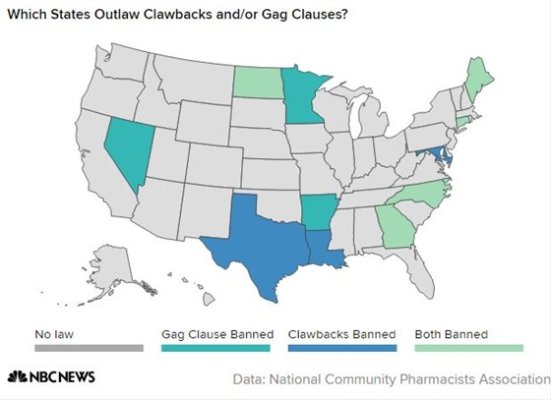tfudtuckerpucker
Full time employment: Posting here.
I learned something new about prescription drug prices. It's called "gag clauses" and "clawbacks", which prevents pharmacists from revealing that the cash price for a drug may be lower than the copay.
“The clauses that we’re speaking about are really non-disclosure clauses, or as we call them gag clauses, which prevents the pharmacist from disclosing to a patient when the cash price for a medicine may be less than the copay on their insurance,”
"A middleman called a pharmacy benefit manager handles the prescription drug part of your health insurance plan on behalf of your insurer. For patients on certain insurance plans buying certain generic drugs, the benefit manager may charge a copay that exceeds a drug's cash price.
When the benefit manager charges that higher price, and then pockets a portion of the copay — that's a clawback. Because of clawbacks, many Americans are paying extra for some of the most commonly prescribed drugs in the country, pharmacists and other experts say.
Consumers rarely hear about clawbacks, pharmacists around the country told NBC News, because of so-called "gag clauses" in their contracts that they say often prevent them from discussing the practice with customers or from volunteering lower-cost options."
‘Gag Clause’ Keeping Pharmacies From Revealing Lower-Cost Drug Options
Could Your Health Insurance Be Costing You Money at the Pharmacy?
Here are the states that outlaw "gag clauses" or "clawbacks"
“The clauses that we’re speaking about are really non-disclosure clauses, or as we call them gag clauses, which prevents the pharmacist from disclosing to a patient when the cash price for a medicine may be less than the copay on their insurance,”
"A middleman called a pharmacy benefit manager handles the prescription drug part of your health insurance plan on behalf of your insurer. For patients on certain insurance plans buying certain generic drugs, the benefit manager may charge a copay that exceeds a drug's cash price.
When the benefit manager charges that higher price, and then pockets a portion of the copay — that's a clawback. Because of clawbacks, many Americans are paying extra for some of the most commonly prescribed drugs in the country, pharmacists and other experts say.
Consumers rarely hear about clawbacks, pharmacists around the country told NBC News, because of so-called "gag clauses" in their contracts that they say often prevent them from discussing the practice with customers or from volunteering lower-cost options."
‘Gag Clause’ Keeping Pharmacies From Revealing Lower-Cost Drug Options
Could Your Health Insurance Be Costing You Money at the Pharmacy?
Here are the states that outlaw "gag clauses" or "clawbacks"


